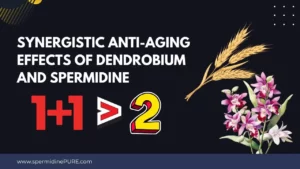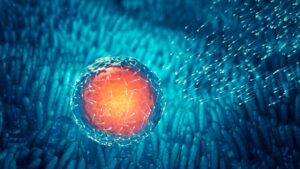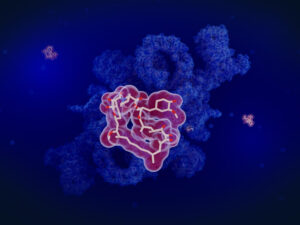Have you ever wondered if there’s a natural way to promote hair growth and combat age-related hair loss? Look no further than spermidine, a naturally occurring compound backed by scientific research to improve hair health. Spermidine works by enhancing the anagen phase of hair growth and reducing the catagen phase, resulting in increased hair strands and overall improvement in hair density.
By exploring the connection between spermidine and hair growth in more detail, you can gain valuable insights into how this compound can help you achieve the thick, healthy hair you’ve always desired. Various studies, like the one published on PubMed, have already shown the positive effects spermidine can have on human hair growth and epithelial stem cell functions, providing not only a powerful stimulant for hair growth but also a new way to understand stem cell biology.
As you delve further into the science behind spermidine and its benefits for hair growth, you’ll uncover the mechanisms and processes that make this compound a promising solution for maintaining and improving hair health. This opens up new possibilities for combating hair loss and enhancing overall hair quality, ultimately empowering you to take control of your hair’s appearance and health.
Spermidine and Its Role in Hair Growth
Spermidine is a naturally occurring polyamine that is crucial in various cellular functions. Regarding your hair, recent research has shown that spermidine can positively impact hair growth and even reverse age-related hair loss.
Mechanism of Action
The way spermidine works in promoting hair growth is by affecting the hair follicle’s life cycle. Your hair goes through multiple phases: the anagen (growth) phase, the catagen (transition) phase, and the telogen (resting) phase. Spermidine is believed to increase the number of hair strands in the anagen phase while decreasing the strands in the catagen phase, ultimately leading to increased hair growth [source].
Additionally, spermidine has been found to modulate human epithelial stem cell functions, which in turn contribute to hair growth, as evidenced by a study published in PubMed.
Spermidine Sources
To take advantage of spermidine’s hair growth-promoting properties, you should consider incorporating spermidine-rich foods into your diet. Some examples of such foods are:
- Whole grains (e.g., wheat germ, brown rice)
- Legumes (e.g., soybeans, lentils)
- Mushrooms
- Leafy greens (e.g., spinach, kale)
- Cheeses (especially aged cheeses)
- Lean meats (e.g., chicken, turkey)
- Fish (e.g., mackerel, anchovies)
Alternatively, you can opt for spermidine supplements, which can be a convenient way to ensure you receive a consistent daily dose to support your hair growth journey.
Spermidine Promotes Human Hair Growth and Is a Novel Modulator of Human Epithelial Stem Cell Functions
Hair is an important part of your overall appearance, and healthy hair growth depends on various factors. One promising compound that can positively impact hair growth is spermidine – a natural polyamine in many foods and human tissues. Research has shown that spermidine can promote human hair growth and modulate human epithelial stem cell functions.
In a study published in PLoS One, researchers found that spermidine can stimulate human hair follicle growth. Hair follicles are highly proliferative mini-organs, making polyamines crucial for proper functioning. The study demonstrated that spermidine can affect hair growth by modulating human epithelial stem cell functions, specifically in hair follicles.
The role of spermidine in hair growth can be further understood through its biological actions. Some key functions of spermidine in relation to hair growth include:
- Autophagy induction: Spermidine helps in the recycling and removal of cellular components via autophagy, which can have a positive impact on hair follicle health.
- Anti-inflammatory effects: Spermidine has been reported to exhibit anti-inflammatory properties, which can contribute to a healthy hair growth environment.
- Stress resistance: As a polyamine, spermidine may also help your hair follicles resist stress by stabilizing cellular structures and promoting healthy growth.
While more research is necessary to fully understand spermidine’s potential benefits and applications for hair growth, incorporating foods rich in spermidine into your diet may help support your hair’s overall health. Some spermidine-rich foods include:
- Wheat germ
- Soybeans
- Mushrooms
- Legumes
- Age cheese
Remember that while spermidine is an exciting discovery in promoting healthy hair growth, it is only one piece of the puzzle. Maintaining good nutrition, practicing proper hair care, and addressing any underlying health issues are all essential for promoting hair growth and maintaining your hair’s health.
Scientific Research on Spermidine and Hair Growth
In Vitro Studies
In a study conducted with isolated human hair follicles, it was discovered that spermidine promotes hair growth by stimulating hair shaft elongation and prolonging the anagen phase of hair growth. The administration of spermidine for 6 days resulted in a slight but significant increase in hair shaft growth in organ-cultured scalp hair follicles (source).
Animal Studies
Though there is limited direct evidence from animal studies on the effects of spermidine on hair growth, research on polyamines, like spermine, spermidine, and their precursor putrescine, have shown a correlation between polyamines and hair growth (source). Further research in animal models would help to understand better the role of spermidine in promoting hair growth.
Human Studies
In human research, spermidine has been identified as a potent stimulator of hair growth and a modulator of human epithelial stem cell functions (source). Spermidine has been found to reverse age-related hair loss and promote the production of new hair strands by increasing the number of hair strands in the anagen phase while decreasing the strands in the catagen phase (source).
While the available evidence suggests a positive effect of spermidine on hair growth, more extensive human studies are needed to better establish the efficacy and safety of spermidine for hair growth promotion.
Potential Benefits and Applications
Treating Hair Loss
Spermidine, a naturally occurring polyamine, has been shown to positively impact hair growth by treating hair loss. With age, hair loss becomes more common, and finding effective ways to combat this issue is essential. Research suggests that spermidine reverses age-related hair loss by increasing the number of hair strands in the anagen phase while decreasing the strands in the catagen phase. This leads to an overall improvement in hair health and growth. [source]
Promoting Hair Growth
As mentioned earlier, spermidine can increase the number of hair strands in the anagen phase, known as the growth phase. During the anagen phase, your hair grows actively, and the follicle cells divide quickly. By increasing the number of strands in this phase, spermidine promotes healthy hair growth.
Moreover, a study found that six-day spermidine treatment significantly increased hair shaft elongation in organ-cultured human hair follicles. This suggests that spermidine can directly affect hair growth by promoting the elongation of the hair shaft. [source]
Spermidine also affects human epithelial stem cell functions. It can modulate stem cell biology, which is crucial for hair growth, as stem cells play a fundamental role in the hair cycle. This novel finding demonstrates spermidine’s potential to promote hair growth and reduce hair loss. [source]
Best Vitamins and Supplements For Hair Growth
Regarding hair growth, certain vitamins and supplements have been found to be effective. Incorporating these nutrients into your daily regimen can help promote healthy hair. This section will discuss the benefits of Biotin, Vitamin A, Vitamin B, NMN, Folate, and Iron.
Biotin
Biotin is a popular vitamin known for its role in promoting hair growth. It is a water-soluble B vitamin that helps convert food into energy. A biotin deficiency can lead to hair thinning and loss. Incorporating biotin-rich foods, such as eggs, almonds, and spinach, or supplements can help support healthy hair growth.
Vitamin A
Vitamin A is essential for maintaining healthy hair, as it aids in producing sebum, which keeps the scalp moisturized. Consuming foods rich in vitamin A, such as carrots, sweet potatoes, and kale, or taking supplements can support hair growth by maintaining healthy hair follicles and preventing hair from becoming dry and brittle.
Vitamin B
Vitamin B complex plays a crucial role in hair growth, as it contributes to the formation of red blood cells, which transport oxygen and nutrients to the scalp and hair follicles. Including vitamin B-rich foods like whole grains, meat, and dairy products in your diet or opting for a B-complex supplement can help nourish your hair from within.
NMN
Nicotinamide mononucleotide (NMN) is a molecule linked to anti-aging and overall health. It helps enhance the production of NAD+, an essential coenzyme that plays a role in cellular energy production and overall hair health. NMN supplements may contribute to hair growth by promoting follicle cell activity and improving cellular vitality.
Folate
Folate, also known as folic acid, is a B-vitamin that helps create red blood cells and aids in synthesizing DNA, which is critical for hair growth. Good sources of folate include leafy green vegetables, legumes, and citrus fruits. Taking a folic acid supplement can further ensure you’re getting enough of this vital nutrient to support hair growth.
Iron
Iron is an essential mineral that helps red blood cells transport oxygen to your hair follicles, promoting growth. A deficiency in iron can lead to hair loss and thinning hair. To maintain healthy hair growth, incorporate iron-rich foods such as red meat, lentils, and spinach, or take an iron supplement as needed.
Safety and Side Effects
As you explore the potential benefits of spermidine for hair growth, it’s essential to consider its safety and possible side effects. Spermidine is a naturally occurring compound found in various foods, and according to a comprehensive review, it has multiple health effects, such as anti-aging, anti-inflammation, and cardiovascular protection.
Most people can safely consume spermidine through their diets without any adverse effects. However, like with any supplement or compound, it’s crucial to be mindful of potential side effects and interactions, especially when consuming it in higher concentrations.
Some individuals might experience mild gastrointestinal symptoms, such as bloating or stomach discomfort when consuming spermidine supplements. To minimize these side effects, start with a lower dosage and gradually increase it as your body adapts.
Moreover, if you’re pregnant, breastfeeding, or taking prescription medications, consult your healthcare provider before starting a spermidine supplement regimen. While there isn’t any specific information on interactions or contraindications, it’s always better to err on caution when introducing new supplements to your routine.
In conclusion, spermidine appears safe for most individuals when consumed through a balanced diet or taken responsibly as a supplement. By being aware of potential side effects and listening to your body’s needs, you can confidently explore the potential of spermidine in promoting hair growth and overall well-being.
Conclusion
In summary, spermidine is a promising polyamine that has shown the potential to promote hair growth. By increasing the number of hair strands in the anagen phase and decreasing strands in the catagen phase, spermidine may help reverse age-related hair loss and stimulate the production of new hair.
With its presence in various food sources, you may consider incorporating spermidine-rich foods in your diet or taking advantage of available spermidine supplements for a more targeted approach. However, always consult with a healthcare professional before making significant changes to your diet or supplement routine.
As you continue exploring the benefits of spermidine for hair growth, keep in mind that more research is needed to fully understand its mechanisms and long-term effects. By staying informed and maintaining realistic expectations, you’re proactively addressing hair-related concerns and embracing a holistic approach to your health and well-being.



